Practical Nursing: Interprofessional Care Presentation (PNUR250)
VerifiedAdded on 2022/08/08
|19
|1248
|231
Presentation
AI Summary
This presentation provides an overview of interprofessional care (IPC) within a nursing context, addressing its core competencies and benefits from a client's perspective. It analyzes a scenario involving medication administration in a long-term care setting, highlighting challenges faced by healthcare professionals, such as stress management and resource limitations. The presentation emphasizes the importance of IPC in enhancing patient outcomes, satisfaction, and communication. It then offers recommendations for incorporating IPC into nursing practice, including promoting teamwork, improving communication, and focusing on patient-centered care to optimize healthcare delivery. The presentation also references relevant literature to support its findings and recommendations.

Interprofessional Care
Paraphrase This Document
Need a fresh take? Get an instant paraphrase of this document with our AI Paraphraser
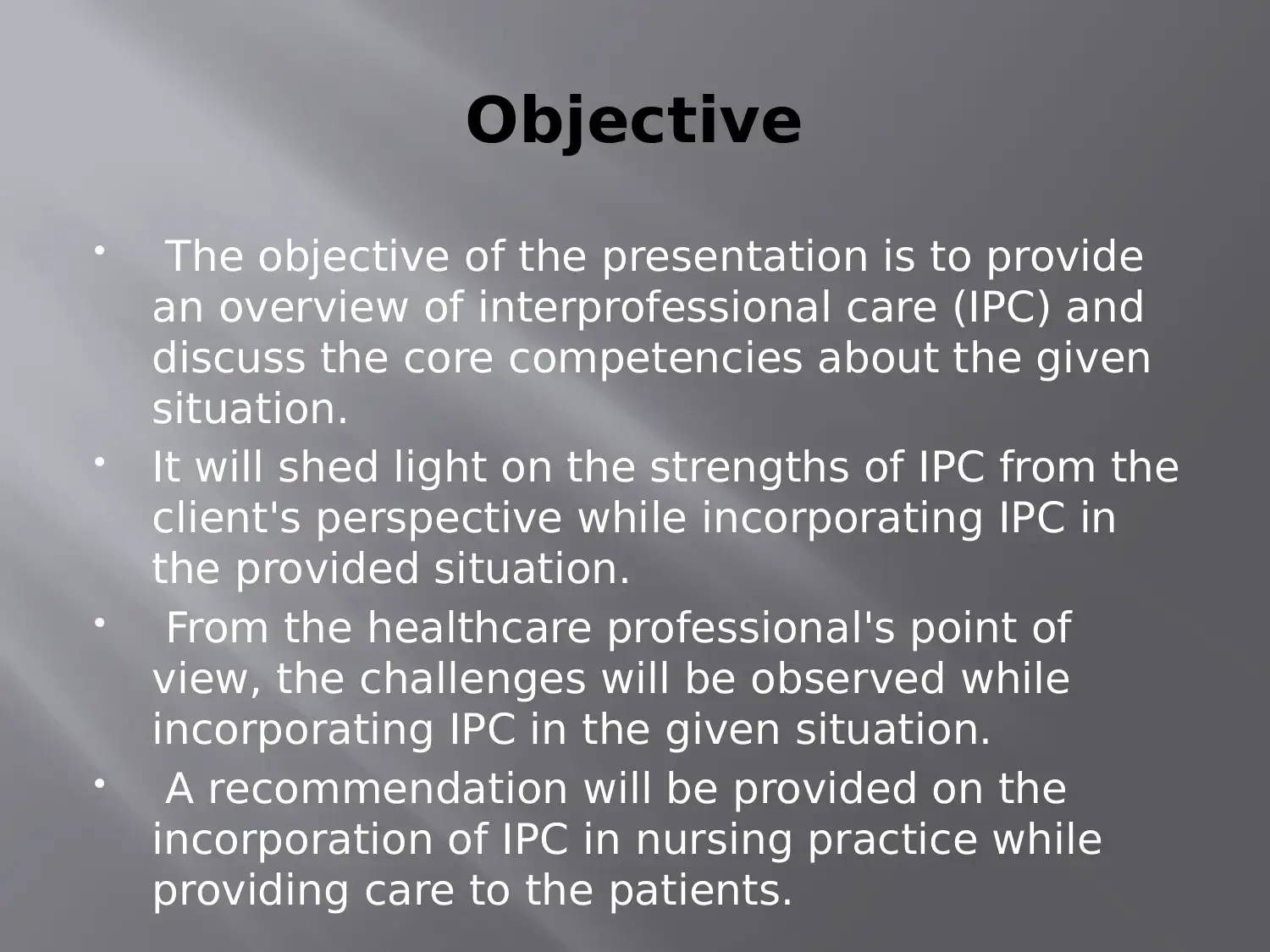
Objective
The objective of the presentation is to provide
an overview of interprofessional care (IPC) and
discuss the core competencies about the given
situation.
It will shed light on the strengths of IPC from the
client's perspective while incorporating IPC in
the provided situation.
From the healthcare professional's point of
view, the challenges will be observed while
incorporating IPC in the given situation.
A recommendation will be provided on the
incorporation of IPC in nursing practice while
providing care to the patients.
The objective of the presentation is to provide
an overview of interprofessional care (IPC) and
discuss the core competencies about the given
situation.
It will shed light on the strengths of IPC from the
client's perspective while incorporating IPC in
the provided situation.
From the healthcare professional's point of
view, the challenges will be observed while
incorporating IPC in the given situation.
A recommendation will be provided on the
incorporation of IPC in nursing practice while
providing care to the patients.
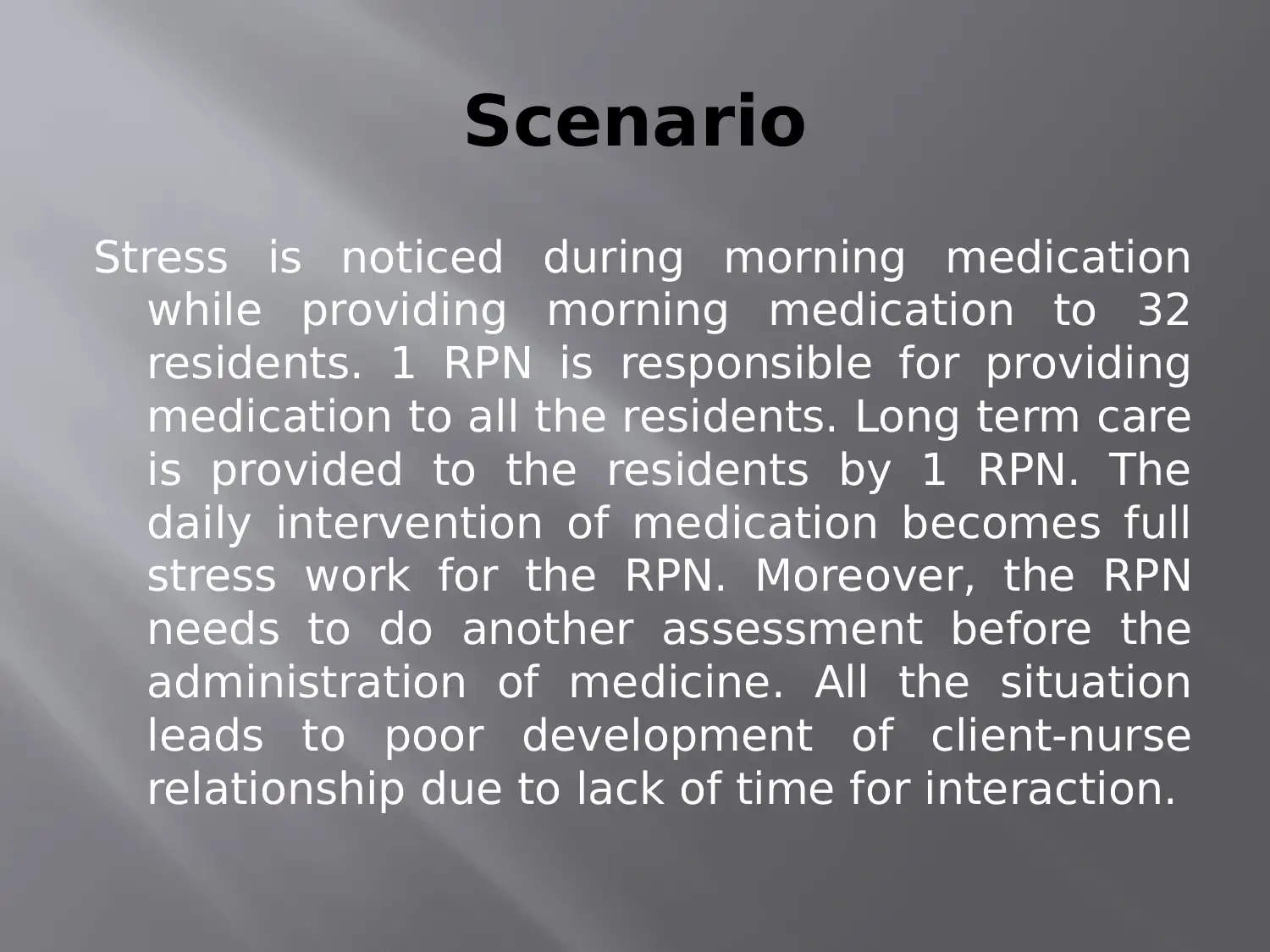
Scenario
Stress is noticed during morning medication
while providing morning medication to 32
residents. 1 RPN is responsible for providing
medication to all the residents. Long term care
is provided to the residents by 1 RPN. The
daily intervention of medication becomes full
stress work for the RPN. Moreover, the RPN
needs to do another assessment before the
administration of medicine. All the situation
leads to poor development of client-nurse
relationship due to lack of time for interaction.
Stress is noticed during morning medication
while providing morning medication to 32
residents. 1 RPN is responsible for providing
medication to all the residents. Long term care
is provided to the residents by 1 RPN. The
daily intervention of medication becomes full
stress work for the RPN. Moreover, the RPN
needs to do another assessment before the
administration of medicine. All the situation
leads to poor development of client-nurse
relationship due to lack of time for interaction.
⊘ This is a preview!⊘
Do you want full access?
Subscribe today to unlock all pages.

Trusted by 1+ million students worldwide
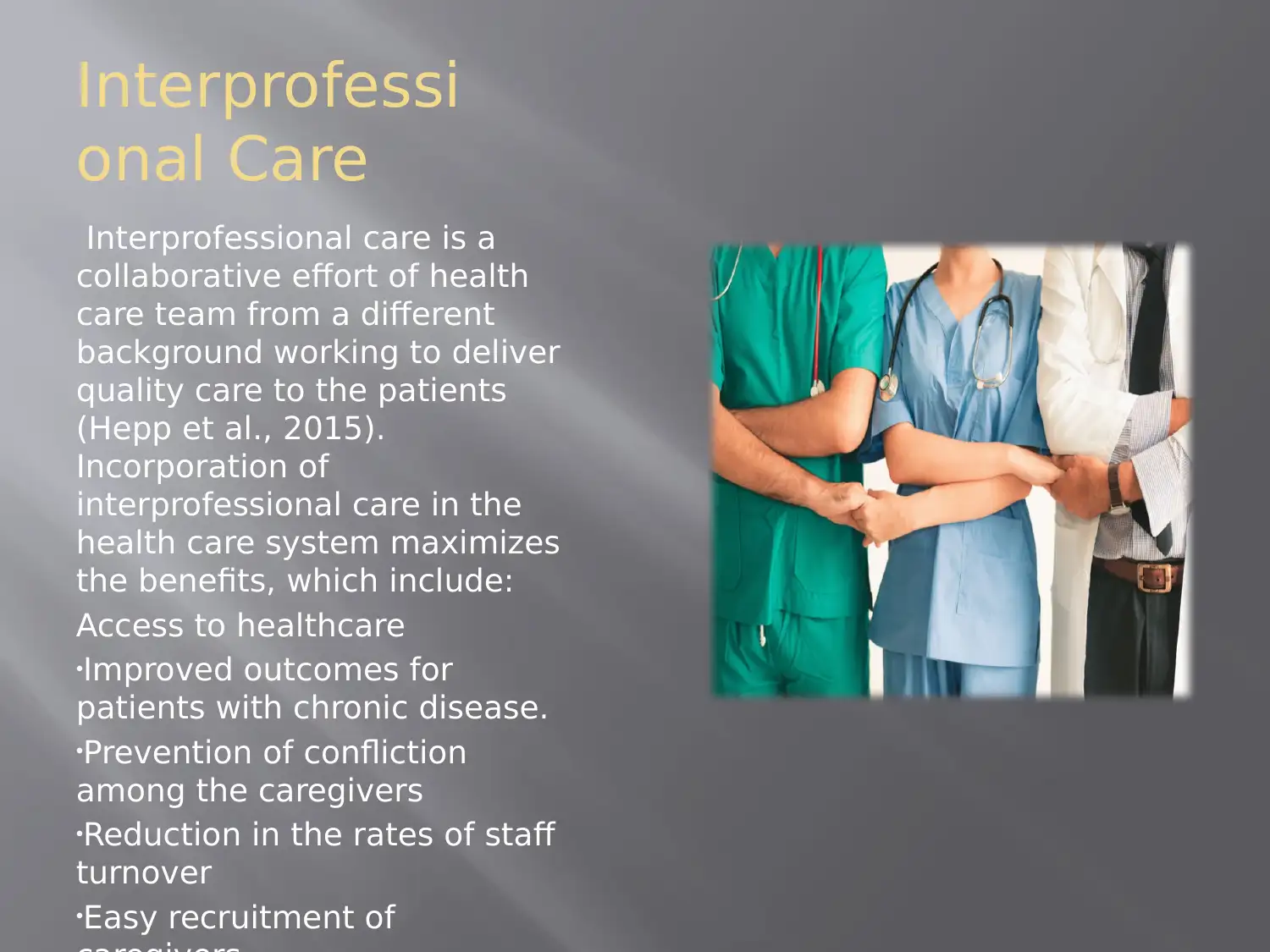
Interprofessi
onal Care
Interprofessional care is a
collaborative effort of health
care team from a different
background working to deliver
quality care to the patients
(Hepp et al., 2015).
Incorporation of
interprofessional care in the
health care system maximizes
the benefits, which include:
Access to healthcare
•Improved outcomes for
patients with chronic disease.
•Prevention of confliction
among the caregivers
•Reduction in the rates of staff
turnover
•Easy recruitment of
onal Care
Interprofessional care is a
collaborative effort of health
care team from a different
background working to deliver
quality care to the patients
(Hepp et al., 2015).
Incorporation of
interprofessional care in the
health care system maximizes
the benefits, which include:
Access to healthcare
•Improved outcomes for
patients with chronic disease.
•Prevention of confliction
among the caregivers
•Reduction in the rates of staff
turnover
•Easy recruitment of
Paraphrase This Document
Need a fresh take? Get an instant paraphrase of this document with our AI Paraphraser
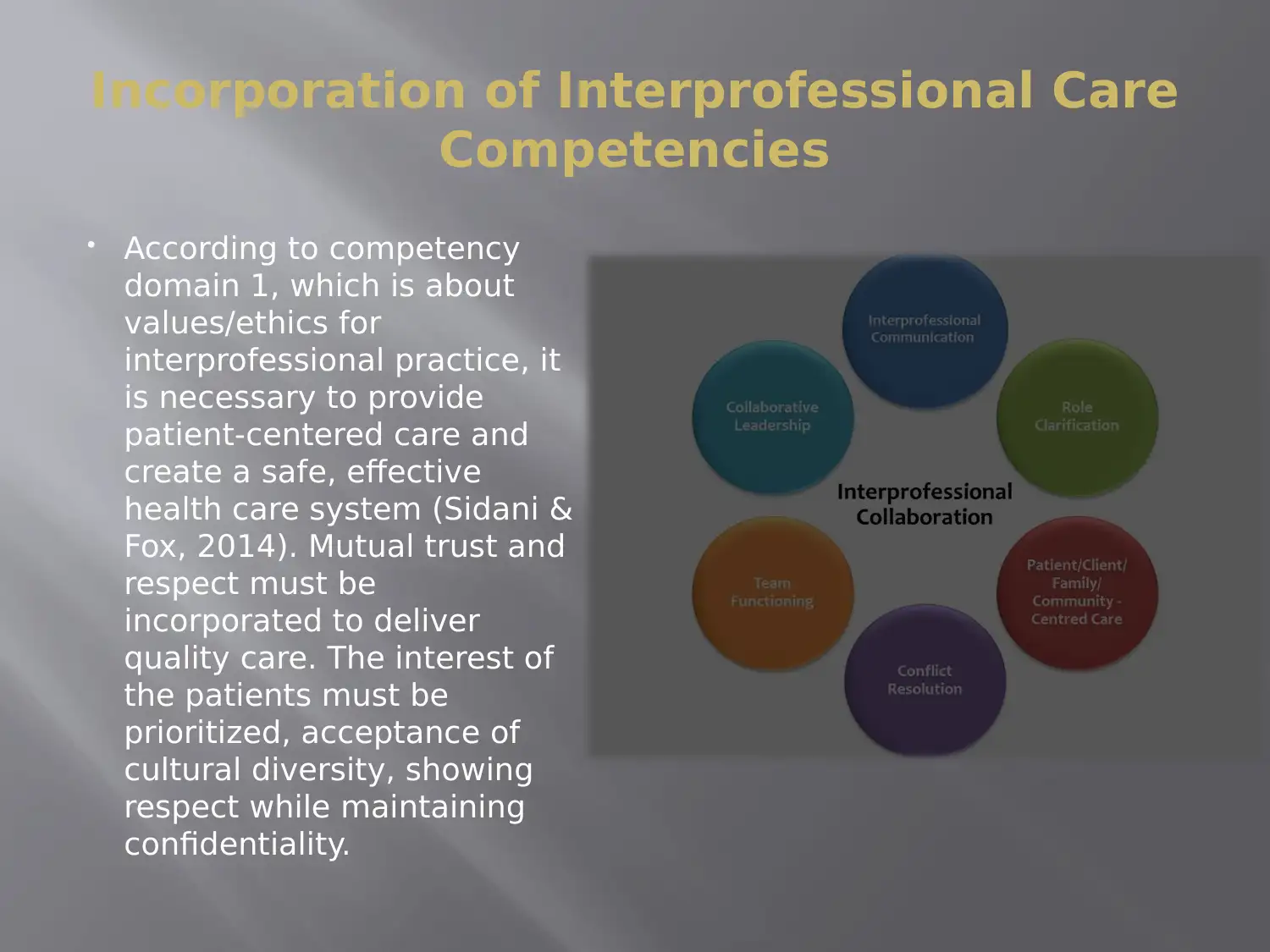
Incorporation of Interprofessional Care
Competencies
According to competency
domain 1, which is about
values/ethics for
interprofessional practice, it
is necessary to provide
patient-centered care and
create a safe, effective
health care system (Sidani &
Fox, 2014). Mutual trust and
respect must be
incorporated to deliver
quality care. The interest of
the patients must be
prioritized, acceptance of
cultural diversity, showing
respect while maintaining
confidentiality.
Competencies
According to competency
domain 1, which is about
values/ethics for
interprofessional practice, it
is necessary to provide
patient-centered care and
create a safe, effective
health care system (Sidani &
Fox, 2014). Mutual trust and
respect must be
incorporated to deliver
quality care. The interest of
the patients must be
prioritized, acceptance of
cultural diversity, showing
respect while maintaining
confidentiality.
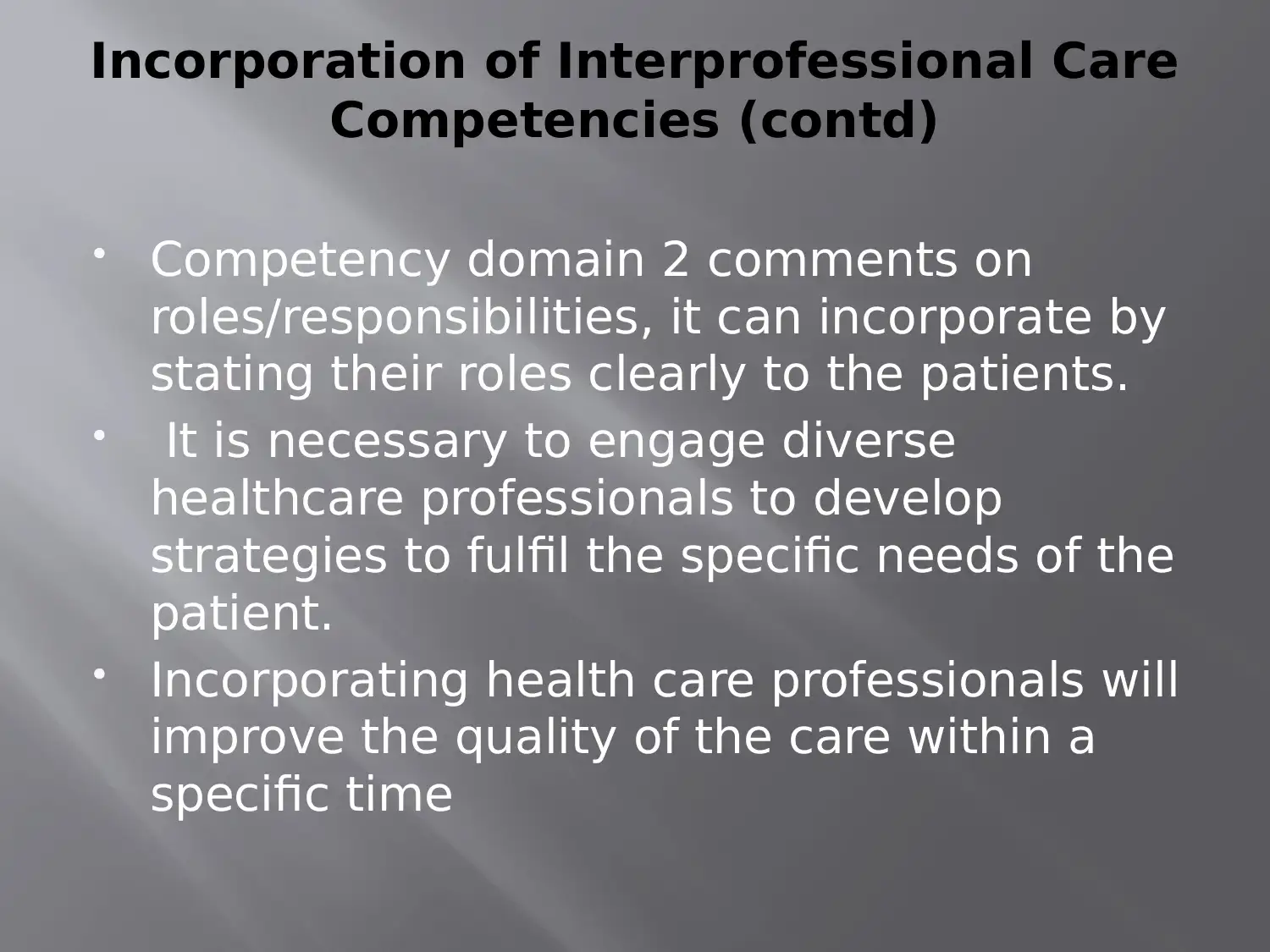
Incorporation of Interprofessional Care
Competencies (contd)
Competency domain 2 comments on
roles/responsibilities, it can incorporate by
stating their roles clearly to the patients.
It is necessary to engage diverse
healthcare professionals to develop
strategies to fulfil the specific needs of the
patient.
Incorporating health care professionals will
improve the quality of the care within a
specific time
Competencies (contd)
Competency domain 2 comments on
roles/responsibilities, it can incorporate by
stating their roles clearly to the patients.
It is necessary to engage diverse
healthcare professionals to develop
strategies to fulfil the specific needs of the
patient.
Incorporating health care professionals will
improve the quality of the care within a
specific time
⊘ This is a preview!⊘
Do you want full access?
Subscribe today to unlock all pages.

Trusted by 1+ million students worldwide
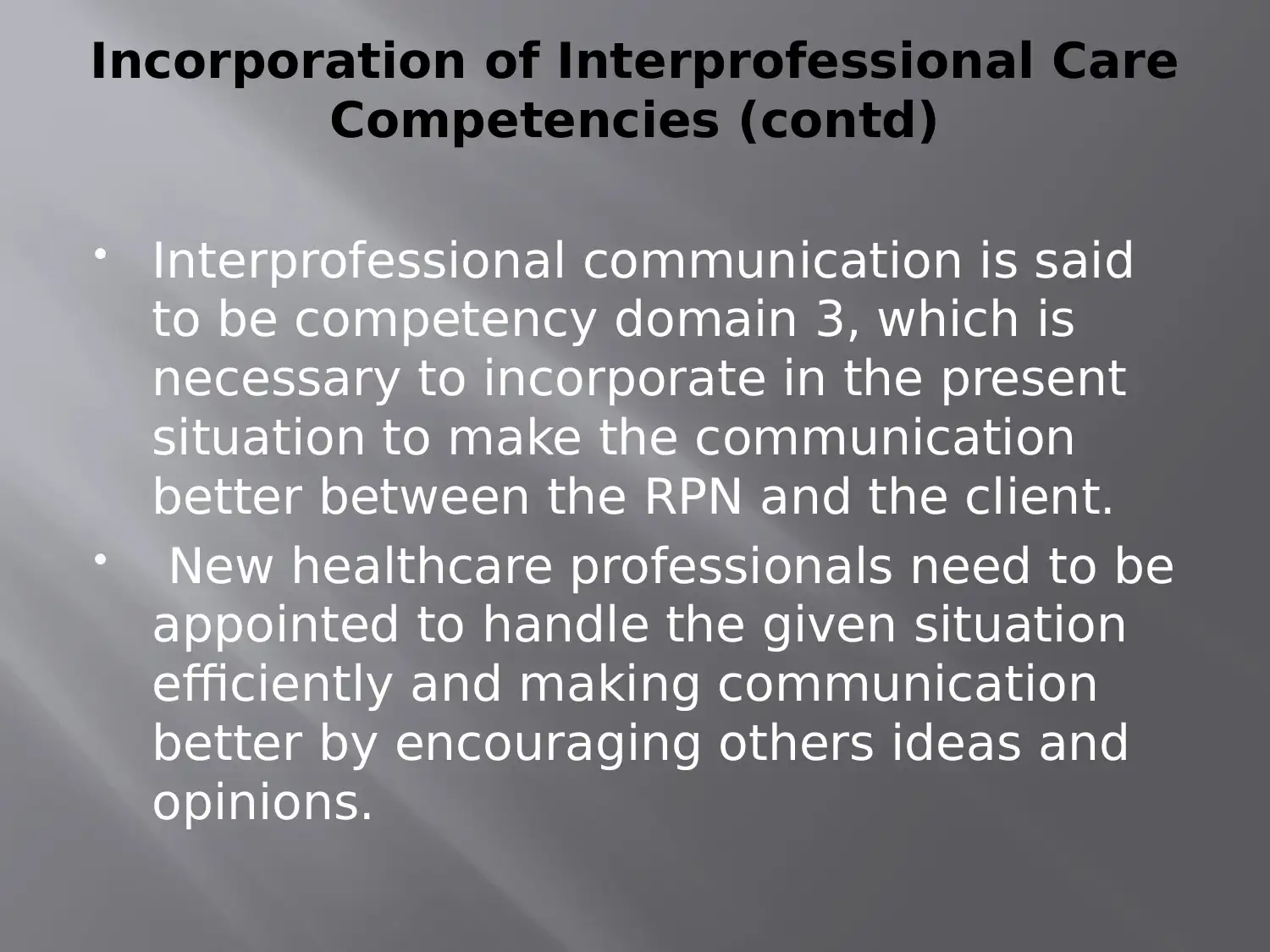
Incorporation of Interprofessional Care
Competencies (contd)
Interprofessional communication is said
to be competency domain 3, which is
necessary to incorporate in the present
situation to make the communication
better between the RPN and the client.
New healthcare professionals need to be
appointed to handle the given situation
efficiently and making communication
better by encouraging others ideas and
opinions.
Competencies (contd)
Interprofessional communication is said
to be competency domain 3, which is
necessary to incorporate in the present
situation to make the communication
better between the RPN and the client.
New healthcare professionals need to be
appointed to handle the given situation
efficiently and making communication
better by encouraging others ideas and
opinions.
Paraphrase This Document
Need a fresh take? Get an instant paraphrase of this document with our AI Paraphraser
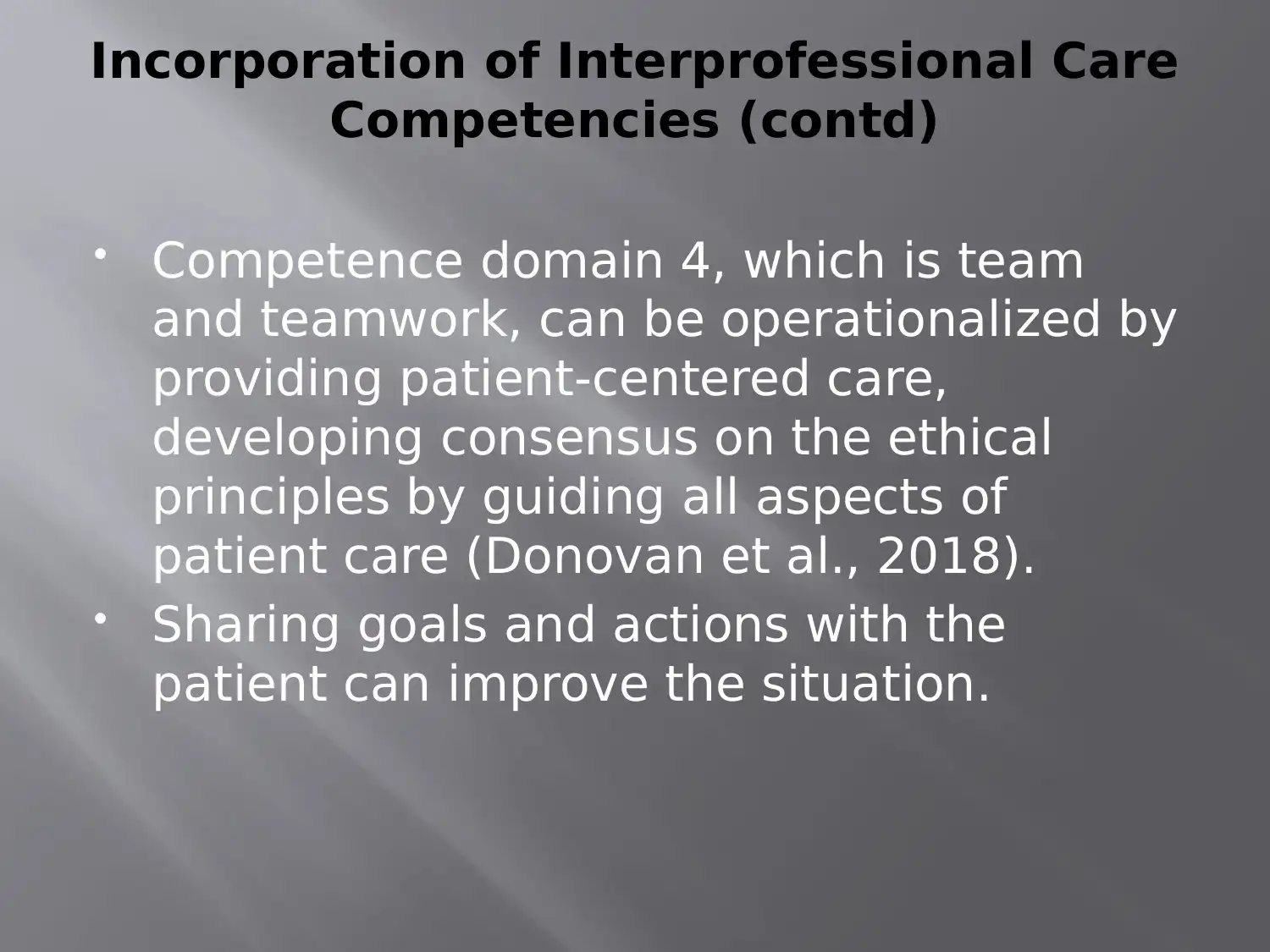
Incorporation of Interprofessional Care
Competencies (contd)
Competence domain 4, which is team
and teamwork, can be operationalized by
providing patient-centered care,
developing consensus on the ethical
principles by guiding all aspects of
patient care (Donovan et al., 2018).
Sharing goals and actions with the
patient can improve the situation.
Competencies (contd)
Competence domain 4, which is team
and teamwork, can be operationalized by
providing patient-centered care,
developing consensus on the ethical
principles by guiding all aspects of
patient care (Donovan et al., 2018).
Sharing goals and actions with the
patient can improve the situation.

Strengths (From the client’s perspective)
From the client's point of
view, incorporation of
interprofessional care will
enhance the patient's health
outcomes. As 1 RPN is
appointed for 32 residents, it
becomes difficult to provide
patient-centered care.
To attain all the patients at a
time, time of interaction with
the client reduces; thus, no
trust is gained. On increasing
patient-centered care, the
chance of positive health
outcomes increases.
From the client's point of
view, incorporation of
interprofessional care will
enhance the patient's health
outcomes. As 1 RPN is
appointed for 32 residents, it
becomes difficult to provide
patient-centered care.
To attain all the patients at a
time, time of interaction with
the client reduces; thus, no
trust is gained. On increasing
patient-centered care, the
chance of positive health
outcomes increases.
⊘ This is a preview!⊘
Do you want full access?
Subscribe today to unlock all pages.

Trusted by 1+ million students worldwide
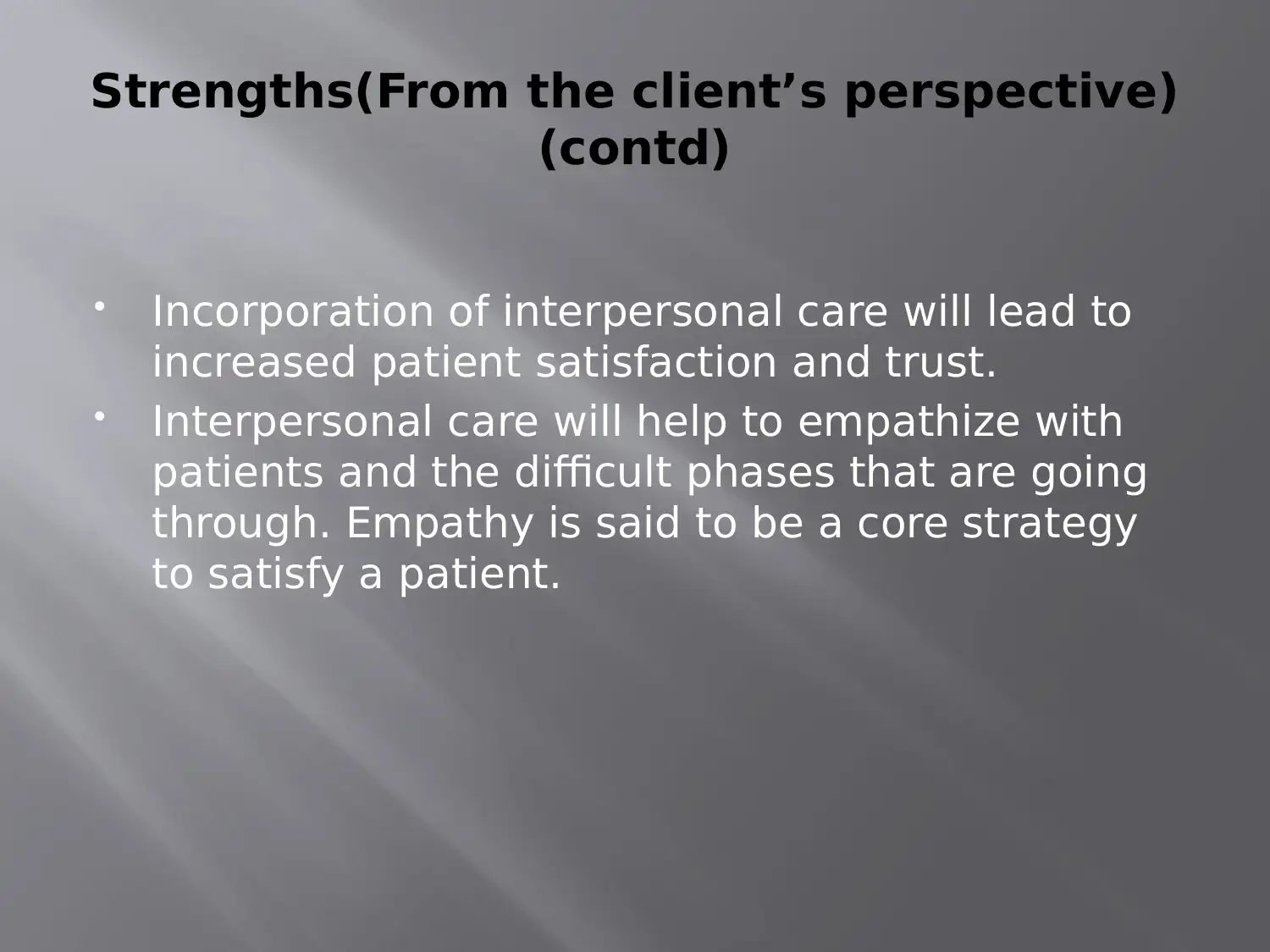
Strengths(From the client’s perspective)
(contd)
Incorporation of interpersonal care will lead to
increased patient satisfaction and trust.
Interpersonal care will help to empathize with
patients and the difficult phases that are going
through. Empathy is said to be a core strategy
to satisfy a patient.
(contd)
Incorporation of interpersonal care will lead to
increased patient satisfaction and trust.
Interpersonal care will help to empathize with
patients and the difficult phases that are going
through. Empathy is said to be a core strategy
to satisfy a patient.
Paraphrase This Document
Need a fresh take? Get an instant paraphrase of this document with our AI Paraphraser
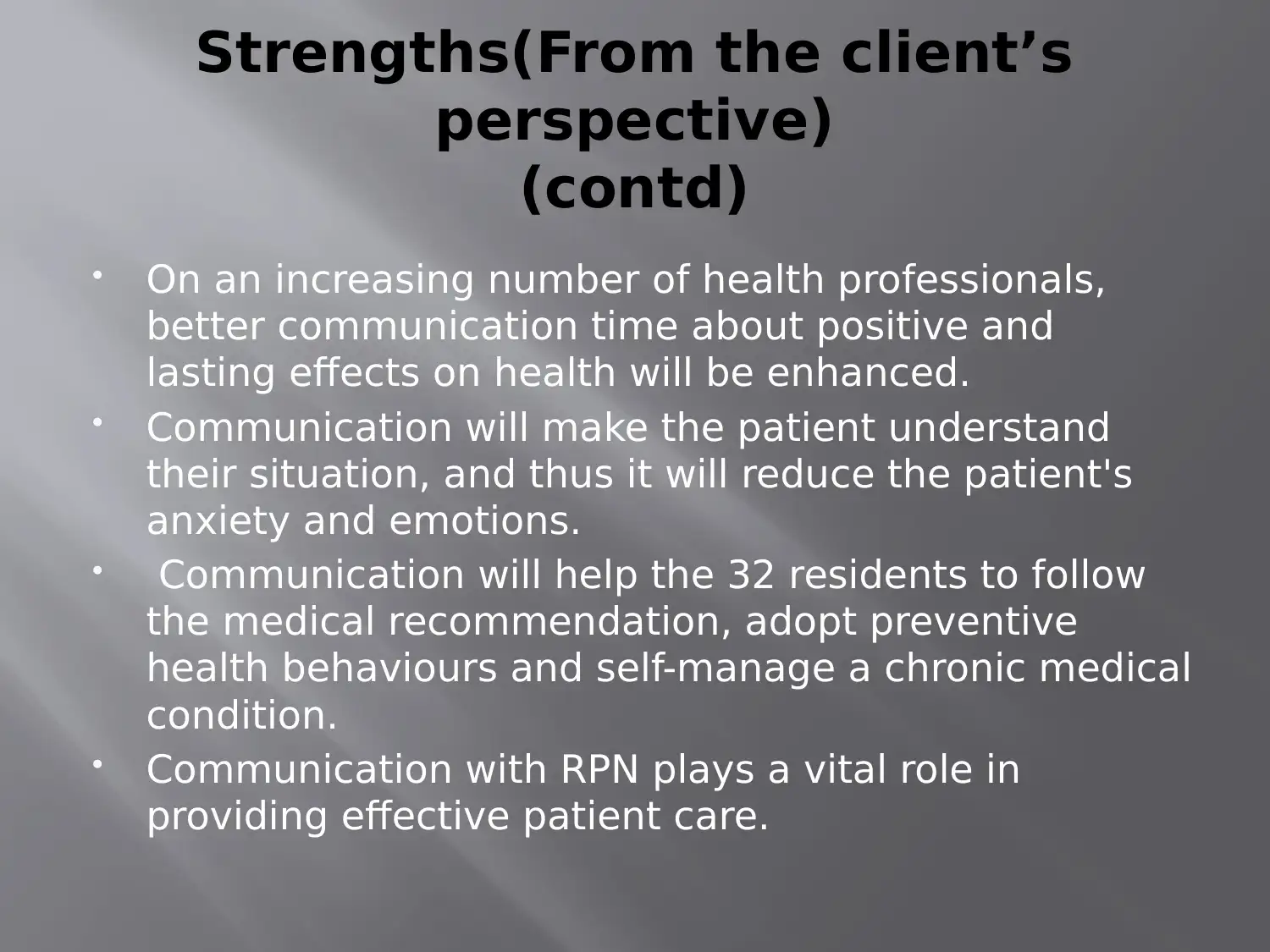
Strengths(From the client’s
perspective)
(contd)
On an increasing number of health professionals,
better communication time about positive and
lasting effects on health will be enhanced.
Communication will make the patient understand
their situation, and thus it will reduce the patient's
anxiety and emotions.
Communication will help the 32 residents to follow
the medical recommendation, adopt preventive
health behaviours and self-manage a chronic medical
condition.
Communication with RPN plays a vital role in
providing effective patient care.
perspective)
(contd)
On an increasing number of health professionals,
better communication time about positive and
lasting effects on health will be enhanced.
Communication will make the patient understand
their situation, and thus it will reduce the patient's
anxiety and emotions.
Communication will help the 32 residents to follow
the medical recommendation, adopt preventive
health behaviours and self-manage a chronic medical
condition.
Communication with RPN plays a vital role in
providing effective patient care.
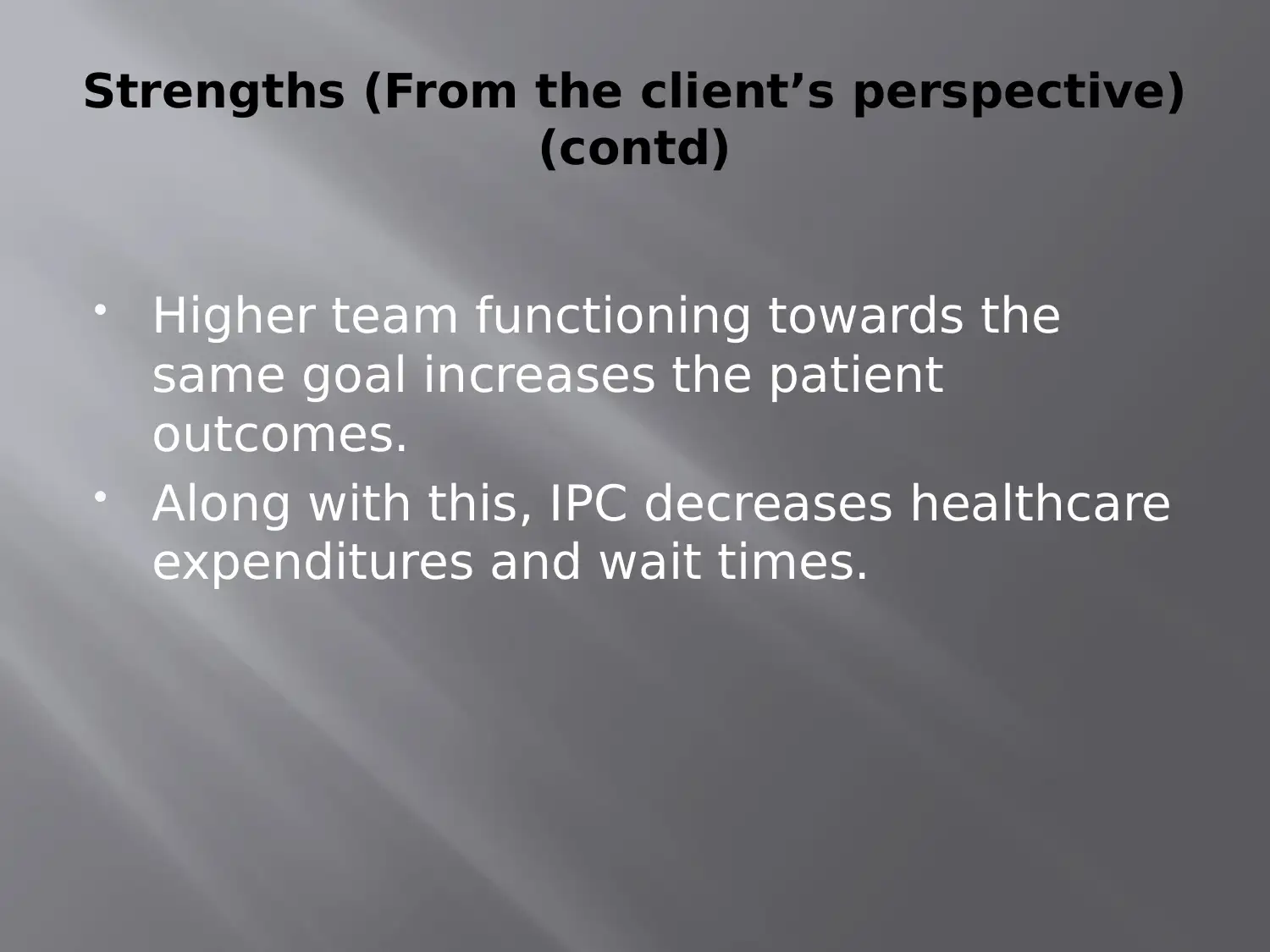
Strengths (From the client’s perspective)
(contd)
Higher team functioning towards the
same goal increases the patient
outcomes.
Along with this, IPC decreases healthcare
expenditures and wait times.
(contd)
Higher team functioning towards the
same goal increases the patient
outcomes.
Along with this, IPC decreases healthcare
expenditures and wait times.
⊘ This is a preview!⊘
Do you want full access?
Subscribe today to unlock all pages.

Trusted by 1+ million students worldwide
1 out of 19
Related Documents
Your All-in-One AI-Powered Toolkit for Academic Success.
+13062052269
info@desklib.com
Available 24*7 on WhatsApp / Email
![[object Object]](/_next/static/media/star-bottom.7253800d.svg)
Unlock your academic potential
Copyright © 2020–2026 A2Z Services. All Rights Reserved. Developed and managed by ZUCOL.





